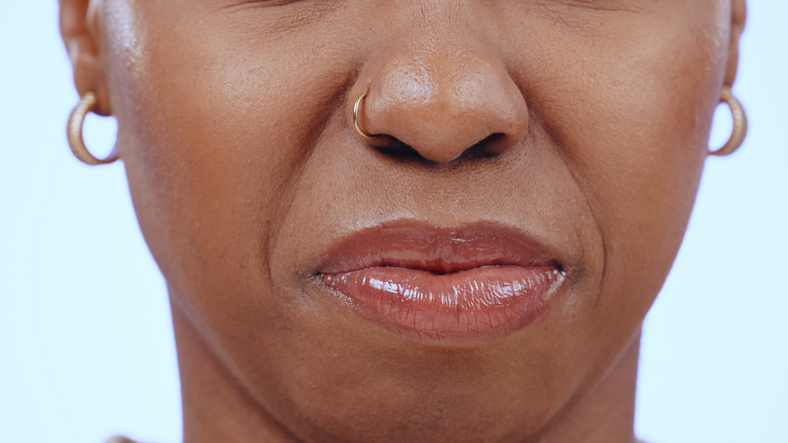Why Do Women Experience The 'Ick' More Than Men?
Why Women Get The ‘Ick’ More Than Men — It Might Just Prolong Their Lives
Researchers suggest that women may experience the “ick”—that sudden feeling of repulsion or disgust toward someone they were once attracted to—more often than men. But what makes this feeling so intense for women, particularly in romantic relationships?

Source: Jacob Wackerhausen / Getty
Procreation is one reason, according to researchers.
Researchers believe that the “ick” could be an evolutionary protective mechanism for procreation. Past studies have found that women tend to score higher in disgust sensitivity compared to men, particularly when it comes to sexual behaviors and pathogens. For instance, a 2011 study by scientist, Joshua Tybur, and his team revealed that women are more sensitive than men to both pathogen-related disgust (fear of illness or contamination) and moral disgust, as well as sexual disgust. In fact, women consistently showed heightened sensitivity across all these areas.
Studies suggest that women’s heightened disgust sensitivity may serve as an instinctual safeguard—if something about a potential partner signals a risk to their own health or the health of future offspring, their disgust response could act as a warning sign to steer clear of unsuitable mates, NSU Florida notes.
For example, a 2018 study conducted by researchers at the London School of Hygiene and Tropical Medicine surveyed over 2,500 people online and found that women consistently reacted with higher levels of disgust when presented with scenarios involving poor hygiene, such as body odor and unflushed toilets, according to the Independent. Whether it’s a partner’s behavior, hygiene, or even subtle cues that could indicate a risk to reproductive success, this instinct may help women avoid situations that could jeopardize their safety or the survival of their children.
Psychologist Naomi Bernstein broke this down further.
Naomi Bernstein, a clinical psychologist in Dallas and co-host of the Oversharing podcast, shared with Time that this phenomenon could indeed have evolutionary roots. She suggests that women’s responses to potential threats are deeply tied to genetic instincts, with an inherent concern for the survival of offspring influencing how they navigate romantic relationships.

Source: Jacob Wackerhausen / Getty
In short, the “ick” might not just be an emotional reaction—it could be an evolutionary tool designed to protect women and ensure the best possible environment for raising healthy children.
“I’m a feminist, and we’re in a world where women have more power,” she explained. “But our human bodies evolved in a patriarchal world where men protected us from predators, and hunted, and were strong.” According to the clinician, this dynamic created a “leftover evolutionary desire” for women to seek potential mates that display certain characteristics, whether they are conscious of it or not.
Bernstein believes that, instinctively, women are wired to seek out partners with “good genes”—traits that can be passed down to future offspring. So, if a man suddenly triggers the “ick,” it could be a subconscious signal that something about him is not ideal for reproduction.
For example, signs like chapped lips or physical weakness might serve as red flags, signaling potential health issues or genetic traits that could be detrimental to the health and survival of offspring. Essentially, these cues may trigger a protective response, steering women away from potential mates who may not be optimal for procreation.
Women are also naturally drawn to traits of “masculinity,” according to Bernstein. So, if you tend to experience the “ick” with men who lack masculine qualities, the same principle applies.
“That feels embarrassing, which means it might not be acceptable by a larger social group—which, coming back to evolution, was essential for human survival,” Bernstein said.

Source: Prostock-Studio / Getty
Safety is key, according Dr. Tara J. Cepon-Robins.
In a 2021 study, Dr. Tara Cepon-Robins, a biological anthropologist at the University of Colorado, and her team of researchers, explored the disgust responses of the Shuar people, an indigenous community in Ecuador. The study, which involved 75 participants aged 5 to 59 from 28 households in three Shuar communities, aimed to understand how disgust sensitivity relates to health outcomes. The communities studied ranged from highly isolated to those partially involved in the larger market economy.
The researchers measured participants’ disgust sensitivity—particularly toward sources of infection like spoiled food—and collected blood and fecal samples to assess bacterial, viral, and parasitic infections as part of the UO-led Shuar Health and Life History Project.
What they found was striking: Shuar individuals who showed higher levels of disgust toward potential sources of pathogens—such as spoiled food—had the lowest levels of infection. In other words, the more disgusted they were, the less likely they were to suffer from infections, regardless of gender, Oregon News noted of the unique study. The data highlighted that disgust, in this case, acted as a protective mechanism, helping individuals avoid sickness.
“This is what disgust is all about—we’re hardwired to be grossed out by things that have harmed people in the past,” Dr. Cepon-Robins told National Geographic about her research of the Shuar.
She also noted that this heightened disgust sensitivity could be especially crucial for women, who are primarily responsible for caring for children. Since young children’s immune systems are more vulnerable to foodborne illnesses, this natural aversion to pathogens may play an important role in safeguarding both their health and the health of the next generation.
Do you feel the “ick” in romantic relationships? Tell us why down in the comments section.
RELATED CONTENT: Tales From TikTok: TikToker’s ‘Icks’ Include White Ex Calling Her N-Word















